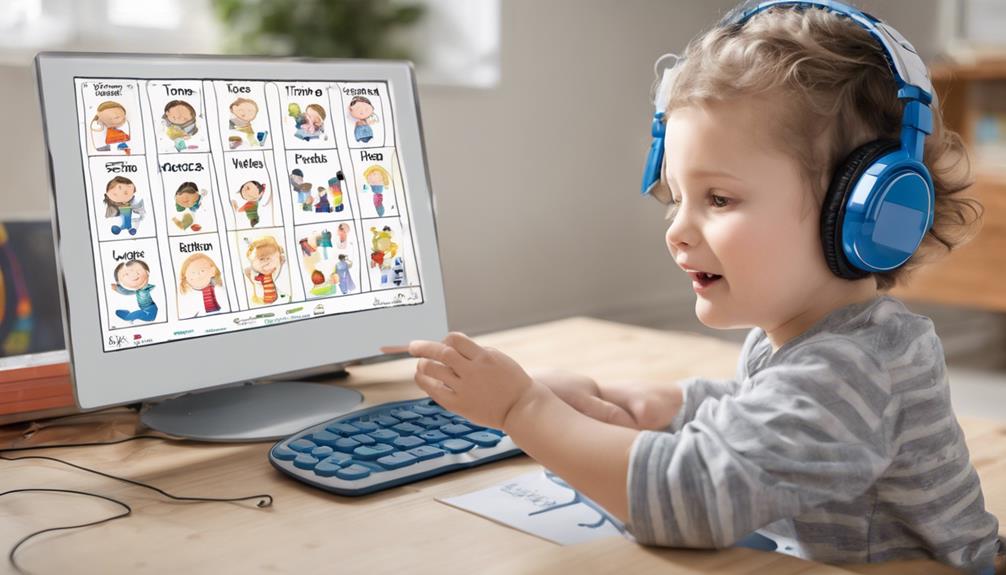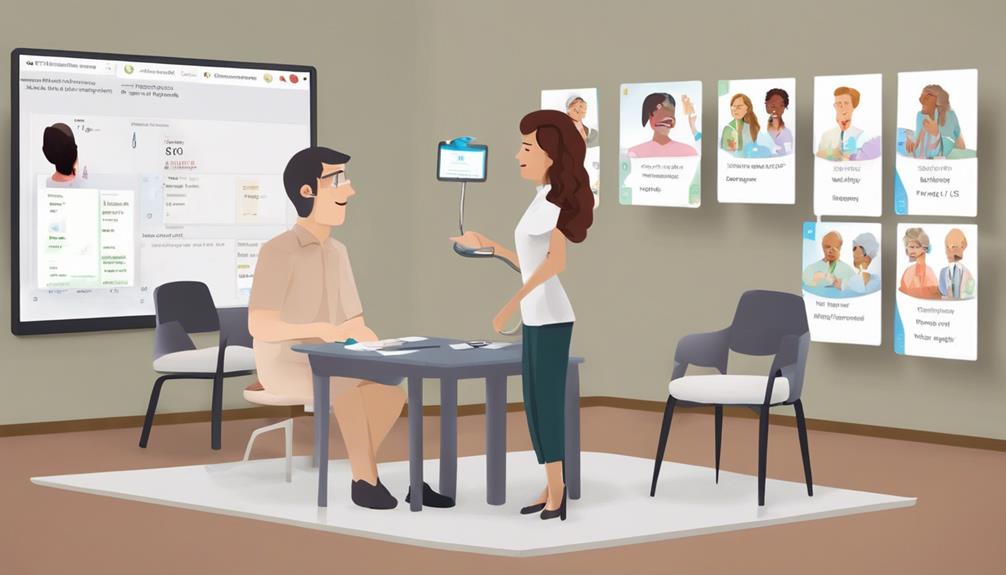As speech therapy professionals, we know that mastering auditory processing tasks is crucial for success in improving communication skills.
From discriminating between sounds to grasping complex directions, these tasks play a vital role in enhancing speech abilities.
But how exactly can these tasks be implemented effectively to yield positive outcomes?
Let's explore five key auditory processing tasks that can significantly impact speech therapy progress and ultimately lead to better communication skills and overall success in therapy sessions.
Key Takeaways
- Enhance auditory processing skills through sound discrimination and phonemic awareness activities.
- Improve listening comprehension and auditory memory for better language development.
- Develop sequencing and following directions abilities to enhance auditory processing.
- Strengthen sound discrimination and listening comprehension for improved speech therapy outcomes.
Sound Discrimination Exercises
Sound discrimination exercises are crucial in enhancing auditory processing skills during speech therapy. These activities help improve a child's ability to differentiate between similar sounds like /b/ and /p/, essential for phonemic awareness development.
Engaging in tasks such as identifying minimal pairs, where only one sound differs between words, enhances auditory processing skills. These exercises aid in distinguishing speech sounds and improve speech sound production and communication skills.
Consistent practice of sound discrimination exercises sharpens children's ability to perceive and differentiate between sounds, laying a strong foundation for improved language development. This targeted approach to auditory processing benefits individuals in speech therapy by honing listening skills and enhancing communication abilities.
Listening Comprehension Tasks

Listening comprehension tasks within speech therapy programs are essential for enhancing understanding of spoken language and improving communication skills. These tasks play a crucial role in developing auditory processing skills in children. By engaging in listening games and activities that require following directions, answering questions, and identifying key details in auditory information, children can improve their auditory memory and overall comprehension abilities. Listening to stories, instructions, and conversations provides valuable practice for processing and understanding spoken language.
These activities not only help children enhance their auditory processing skills but also contribute to improved communication and academic success. Through targeted listening comprehension tasks, children can strengthen their ability to process and interpret auditory information effectively. Speech therapists often incorporate various games and exercises to make the learning process engaging and enjoyable for children while facilitating their development in crucial areas of listening and comprehension.
Phonemic Awareness Activities
Exploring the realm of phonemic awareness activities reveals a crucial aspect of developing auditory processing skills for effective speech therapy outcomes. Phonemic awareness activities are key in helping individuals, especially children with Auditory Processing Disorders, improve their auditory and listening skills. Here are some essential points to consider when implementing phonemic awareness tasks:
- Letter Sounds: Engaging in exercises that focus on individual letter sounds can significantly enhance phonemic awareness and aid in speech therapy progress.
- Segmenting Sounds: Breaking down words into individual sounds helps individuals better understand the components of spoken language, improving overall communication skills.
- Blending Sounds: Activities that involve blending sounds together can assist in developing the ability to comprehend words in the presence of background noise.
- Manipulating Sounds: Tasks that involve manipulating sounds within words can help children with auditory processing challenges improve their reading and spelling abilities.
Incorporating these phonemic awareness activities into speech therapy sessions can have a profound impact on enhancing auditory processing skills and ultimately improving speech and language development.
Auditory Memory Challenges

When addressing auditory memory challenges in speech therapy, tailored strategies and activities are utilized to enhance a child's ability to recall and retain verbal information effectively. Children with auditory memory challenges may find it difficult to follow multi-step directions or remember sequences of sounds or words. Speech therapists employ specific techniques to improve auditory memory, including repetition, chunking information, and using visual aids. These strategies help children with auditory memory difficulties learn and use language more effectively, supporting their overall language development.
| Strategies | Activities | Impact |
|---|---|---|
| Repetition | Memory games | Reinforces verbal information recall |
| Chunking information | Listening exercises | Helps organize information for easier retention |
| Visual aids | Storytelling activities | Enhances comprehension and memory retention |
Sequencing and Following Directions Exercises
In speech therapy sessions focused on sequencing and following directions exercises, we employ structured activities to enhance auditory processing skills and improve language comprehension. By engaging children with Auditory Processing Disorder in auditory processing activities, we aim to enhance their communication skills and overall auditory processing abilities.
Some key elements of these exercises include:
- Sequencing exercises: These tasks involve arranging steps in a specific order to enhance cognitive processing and memory retention in individuals struggling with auditory processing difficulties.
- Following directions activities: By practicing these activities, children with APD can develop the ability to understand and execute instructions accurately, leading to improved language comprehension.
- Visual aids: Utilizing visual aids can support sequencing and following directions exercises, making the tasks more accessible and engaging for children undergoing speech therapy.
- Structured tasks: Implementing structured tasks in therapy sessions can help children with Auditory Processing Disorder improve their listening skills and ultimately enhance their overall communication abilities.
Frequently Asked Questions
Can Speech Therapy Help With Auditory Processing?
Yes, speech therapy can assist with auditory processing. Therapists target listening skills to improve discrimination, memory, sequencing, and comprehension. Techniques in therapy address underlying issues affecting speech and language development.
Structured activities aim to enhance the brain's ability to process auditory information effectively. Research indicates that speech therapy can result in significant improvements in auditory processing skills, benefiting communication and overall quality of life.
Can You Be Successful With Auditory Processing Disorder?
Yes, individuals with auditory processing disorder can achieve success.
Through targeted speech therapy interventions, tailored strategies, and consistent practice, significant progress can be made in improving auditory processing skills.
With personalized support and specialized therapy approaches, individuals can enhance their communication abilities and overcome challenges associated with APD.
Success is attainable with dedication, practice, and the right therapeutic techniques.
What Is the Best Treatment for Auditory Processing Disorder?
The best treatment for auditory processing disorder involves a multi-disciplinary approach. This approach includes speech therapy, auditory training, and educational interventions. Individualized therapy plans tailored to the specific needs of the individual can yield the best results in improving auditory processing skills.
Early intervention and consistent therapy sessions are key components of successful treatment. The goal is to improve functional communication and academic performance.
What Are the Exercises for Auditory Processing?
We engage in various auditory processing exercises to enhance listening skills. These activities include sound localization games, discrimination tasks, mimicking animal sounds, and identifying environmental sounds.
By participating in exercises that focus on auditory discrimination tasks like loudness, pitch, and beats, we improve our ability to process and understand auditory information accurately.
These exercises aim to enhance phonemic awareness, attention to detail, and overall listening skills.
Conclusion
In conclusion, engaging in auditory processing tasks in speech therapy is absolutely crucial for success. These activities may seem simple, but they've a profound impact on developing listening skills and improving overall auditory processing abilities.
By incorporating these tasks into therapy sessions, clients can enhance their ability to discriminate sounds, comprehend speech, increase phonemic awareness, strengthen auditory memory, and follow directions more effectively.
The benefits of these tasks are truly remarkable and can lead to significant progress in speech therapy outcomes.











